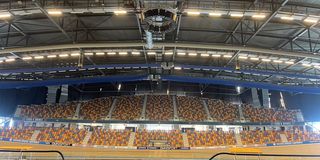FIVB World Championships Notebook - Day 8

Omnisport Stadium in Apeldoorn.
What you need to know:
- The speed limit on major highways in Netherlands is 100kph.
Match venues not volleyball-only stadiums
*****
The match venues for the FIVB World Championships here in Netherlands, Omnisport Stadium in Apeldoorn and Gelredome arena in Arnhem, are not your usual volleyball stadiums. Omnisport is a stadium known for hosting indoor cycling events while Gelredome is the home ground of Vitesse Football Club. The host federation NEVOBO together with FIVB commercial wing Volleyball World have done an amazing job in transforming these two facilities into volleyball stadiums.
The grass at Gelredome has been moved outside the stadium electronically and a new surface has been laid to allow for volleyball to be played. More lights have been fixed on the roofs with new movable stands brought in. It’s an amazing piece of innovation and no wonder the venue is fully sold out for the opening matches Friday.
High taxes make life expensive
*****
Living in the Netherlands is expensive due to the high taxes charged by the government. The income tax is 41 per cent for people earning between 15,000 and 35,000 Euros a year while those earning above 35,000 Euros annually are taxed at 52 per cent of their income. Value Added Tax is at 21 per cent and it’s charged on basic commodities like water and electricity.
Education system very flexible
*****
The education system in Netherlands requires that a student goes through eight years in primary school and either four, five or six years in high school then university. If you choose to have four years in high school, then you are required to attend college for three years before you enroll for university. Those who choose five years can enroll for a bachelor's degree in university immediately after they complete high school. Interestingly those who choose six years don’t have to study their bachelors and can enroll for a Masters degree programme straight from high school.
Speed limits to limit pollution
*****
The speed limit on major highways in Netherlands is 100kph. Previously locals were allowed to drive at 130kph but the government reduced it to 100kph in a bid to reduce air pollution by speeding cars. The government has also done a good job in planting trees along the major highways so the speed limit complements their efforts to conserve the environment.





